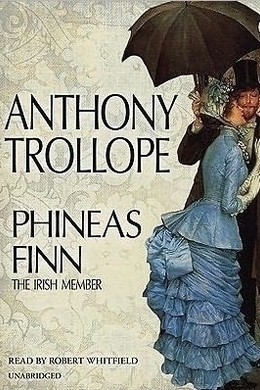
Phineas Finn
The Irish Member
by Anthony Trollope
subjects: Classic Fiction
series: Palliser Novels (#2)
-
EPUB 679 KB
-
Kindle 892 KB
-
Support epubBooks by making a small $2.99 PayPal donation purchase.
Description
The novel is set against the background of the Reform Bill of 1867, and focuses on an Irish Member of the British House of Commons; in it Trollope explores the relations between the distinct elements of ‘the United Kingdom’. Phineas has a personal chronicle which largely dominates the political calendar and it is noteworthy that Trollope wrote Phineas Finn at the same time as Gladstone’s accession to power and the momentous consequences for Ireland that followed. Phineas Finn is the second of the Palliser novels. As a group they provide us with the most extensive and telling expos of British life during the period of its greatest prestige.
1043 pages with a reading time of ~16 hours (260774 words), and first published in 1869. This DRM-Free edition published by epubBooks, 2014.
Community Reviews
There are currently no other reviews for this book.
Excerpt
Dr. Finn, of Killaloe, in county Clare, was as well known in those parts,–the confines, that is, of the counties Clare, Limerick, Tipperary, and Galway,–as was the bishop himself who lived in the same town, and was as much respected. Many said that the doctor was the richer man of the two, and the practice of his profession was extended over almost as wide a district. Indeed the bishop whom he was privileged to attend, although a Roman Catholic, always spoke of their dioceses being conterminate. It will therefore be understood that Dr. Finn,–Malachi Finn was his full name,–had obtained a wide reputation as a country practitioner in the west of Ireland. And he was a man sufficiently well to do, though that boast made by his friends, that he was as warm a man as the bishop, had but little truth to support it. Bishops in Ireland, if they live at home, even in these days, are very warm men; and Dr. Finn had not a penny in the world for which he had not worked hard. He had, moreover, a costly family, five daughters and one son, and, at the time of which we are speaking, no provision in the way of marriage or profession had been made for any of them. Of the one son, Phineas, the hero of the following pages, the mother and five sisters were very proud. The doctor was accustomed to say that his goose was as good as any other man’s goose, as far as he could see as yet; but that he should like some very strong evidence before he allowed himself to express an opinion that the young bird partook, in any degree, of the qualities of a swan. From which it may be gathered that Dr. Finn was a man of common-sense.
Phineas had come to be a swan in the estimation of his mother and sisters by reason of certain early successes at college. His father, whose religion was not of that bitter kind in which we in England are apt to suppose that all the Irish Roman Catholics indulge, had sent his son to Trinity; and there were some in the neighbourhood of Killaloe,–patients, probably, of Dr. Duggin, of Castle Connell, a learned physician who had spent a fruitless life in endeavouring to make head against Dr. Finn,–who declared that old Finn would not be sorry if his son were to turn Protestant and go in for a fellowship. Mrs. Finn was a Protestant, and the five Miss Finns were Protestants, and the doctor himself was very much given to dining out among his Protestant friends on a Friday. Our Phineas, however, did not turn Protestant up in Dublin, whatever his father’s secret wishes on that subject may have been. He did join a debating society, to success in which his religion was no bar; and he there achieved a sort of distinction which was both easy and pleasant, and which, making its way down to Killaloe, assisted in engendering those ideas as to swanhood of which maternal and sisterly minds are so sweetly susceptible. “I know half a dozen old windbags at the present moment,” said the doctor, “who were great fellows at debating clubs when they were boys.” “Phineas is not a boy any longer,” said Mrs. Finn. “And windbags don’t get college scholarships,” said Matilda Finn, the second daughter. “But papa always snubs Phinny,” said Barbara, the youngest. “I’ll snub you, if you don’t take care,” said the doctor, taking Barbara tenderly by the ear;–for his youngest daughter was the doctor’s pet.
The doctor certainly did not snub his son, for he allowed him to go over to London when he was twenty-two years of age, in order that he might read with an English barrister. It was the doctor’s wish that his son might be called to the Irish Bar, and the young man’s desire that he might go to the English Bar. The doctor so far gave way, under the influence of Phineas himself, and of all the young women of the family, as to pay the usual fee to a very competent and learned gentleman in the Middle Temple, and to allow his son one hundred and fifty pounds per annum for three years. Dr. Finn, however, was still firm in his intention that his son should settle in Dublin, and take the Munster Circuit,–believing that Phineas might come to want home influences and home connections, in spite of the swanhood which was attributed to him.
